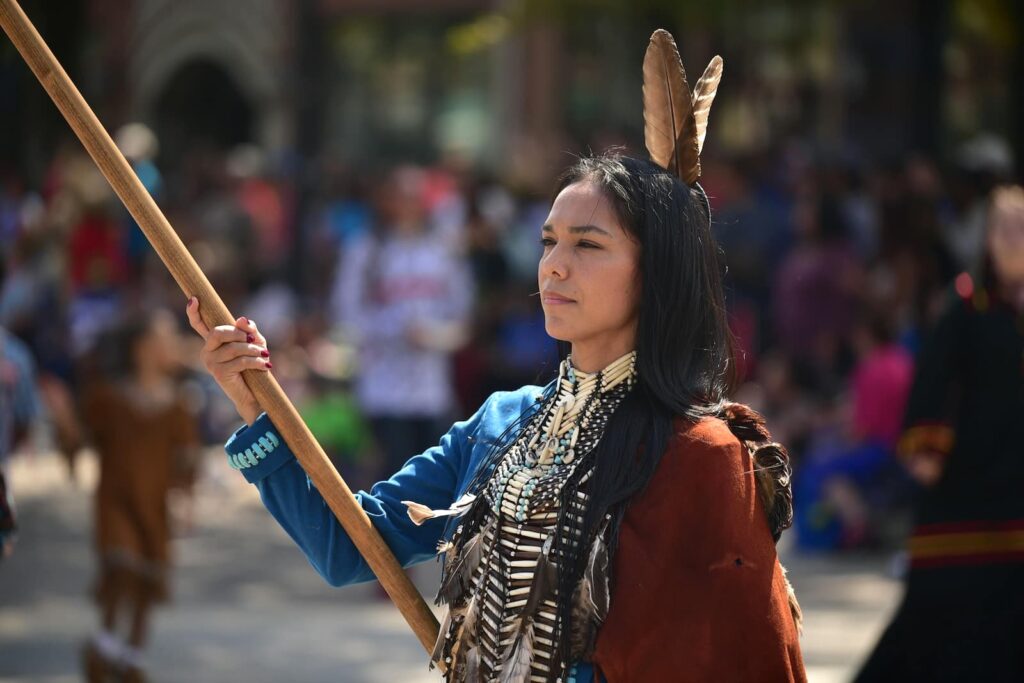
David
Republished on (Originally released on )
![October's Competing US Holidays [Updated] October's Competing US Holidays [Updated]](https://assets.blog.engoo.com/wp-content/uploads/sites/9/2024/10/26014518/october_holidays_new_cover-1024x682.jpg)
"In 1492, Columbus sailed the ocean blue."
Many American schoolchildren learn this simple rhyme to help them remember Christopher Columbus and what he's famous for.
For many years, people in the US and several other countries have celebrated a day honoring Columbus in early October. But there's another holiday at the same time that was created as a response to Columbus Day.
Because language is connected to culture, let's take a look at both of these holidays, learn some history behind them and vocabulary related to them.

Columbus was an Italian explorer who sailed to the Americas in the 15th century with support from the king and queen of Spain.
But America wasn't where he planned to go; his goal was to find a quick way from Western Europe to islands near China and India. He hoped to trade for spices and other goods only available in that part of the world.
Instead, Columbus' ships made it to the Caribbean (including the Bahamas, the Dominican Republic, Haiti and Cuba today). But Columbus didn't realize that he wasn't in Asia; he called the people he saw "Indians" even though he was far from India. This is why Native Americans are often called "American Indians" even today.
To Columbus and other Europeans, these areas were the "New World," and this began a period called the Age of Discovery, when explorers from European countries colonized many parts of the world.
In the US, the second Monday of October is Columbus Day. It's a federal holiday, which means some businesses, schools and government offices are closed.
But not every holiday is celebrated with food and decorations like Christmas and Halloween. Although some places hold special events, holidays like Columbus Day, Presidents' Day and Labor Day are often days when people simply relax and take a break from work or school.
Related article: "Take it Easy!" 10 English Expressions for Relaxing

"Indigenous" is an adjective describing the first people to live in a place. Therefore, Indigenous Peoples' Day is for celebrating the original people of America.
The arrival of Columbus and other explorers had a very negative effect on the people already living there. Many were killed or were forced to work as slaves for the Europeans. In addition, the explorers brought diseases from their countries that killed many of the native people.
Because of this history, many people have fought against celebrating Columbus with a holiday. Additionally, they say he couldn't have "discovered" a new world if there were people already living there.
So on the second Monday of October — the same day as Columbus Day — they instead celebrate the original Americans to honor their culture and fight against the whitewashing of history.
Similar to Columbus Day, there are no standard ways to celebrate Indigenous Peoples' Day. However, many people use the day to reflect on, or think about, the nation's history and to educate themselves on Native American culture.

"Reflecting" is thinking deeply about something that happened in the past.
After the game, the coach told the team to reflect on what they did well and what they can improve.
Related article: Using Your Head: 15 Different Ways to Say "Think"
When a person or group experiences discrimination, they are treated unfairly by others because of their race, gender, religious beliefs, etc.
Every year, thousands of people leave their home countries to escape violence or discrimination.
Something has been "whitewashed" if embarrassing or unpleasant facts have been hidden to make it look better.
Supporters of Indigenous Peoples' Day say that Columbus Day whitewashes the violence he committed against Native Americans.
As mentioned earlier in the article, colonization is the process of one country taking control of another.
In recent years, many European countries have removed statues and monuments that celebrate their colonization of other nations.
We can use "recognize" to say that we see and understand who or what a person or thing is, like in the following example:
I didn't recognize Beth after she changed her hairstyle.
But it has another meaning too: "to acknowledge the existence, quality or legality of something." This meaning is often used in politics and law.
In 2021, President Joe Biden became the first US president to officially recognize Indigenous Peoples' Day.
We use "adopt" to talk about becoming the parent or guardian of a child or a pet.
We adopted our dog Charlie from the local animal shelter.
However, it can also mean "to choose to accept, use or follow something." This meaning is often applied to laws and special days.
Memorial Day, which honors US soldiers who died serving their country, was first adopted in 1868.
It can be very interesting to look into the history of the holidays people celebrate each year. You'll often be surprised by what you learn — and learning more can give you a new understanding of the culture that celebrates them.
If you found this article interesting, we recommend taking a look at our post on Juneteenth, America's newest federal holiday!
